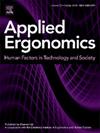Autonomy aweigh: Evaluation metrics and supporting seafarers’ basic psychological needs in energy-efficient route planning DSS
IF 3.4
2区 工程技术
Q2 ENGINEERING, INDUSTRIAL
引用次数: 0
Abstract
To achieve necessary CO2e emission reductions in the maritime industry, decision support systems (DSS) can assist seafarers in energy-efficient operations. However, adequate evaluation measures beyond classical human–machine interaction (HCI) metrics are required to ensure these systems are human-centered and align with Industry 5.0 goals, including human–machine cooperation and basic psychological needs, especially autonomy. Objectives of this research were (1) to understand how different metrics evaluate route-planning DSS and a route adaptation feature, and (2) to explore autonomy support in DSS usage. Simulator (N = 48) and online (N = 20) studies with experienced seafarers showed HCI metrics alone did not quantify the adaptation feature’s potential. Thematic analysis of interviews highlighted algorithm comprehensiveness, usability, user empowerment, and collaborative workflows as key autonomy aspects. Furthermore, seafarers preferred automated information acquisition and analysis but human decision-making for route planning. We discuss design guidelines to improve autonomy satisfaction for energy-efficient route planning.
自主权衡:节能航线规划DSS中海员基本心理需求的评价指标和支持
为了在航运业实现必要的二氧化碳减排,决策支持系统(DSS)可以帮助海员进行节能操作。然而,除了经典的人机交互(HCI)指标之外,还需要适当的评估措施,以确保这些系统以人为中心,并与工业5.0目标保持一致,包括人机合作和基本心理需求,尤其是自主性。本研究的目的是:(1)了解不同指标如何评估路线规划决策支持系统和路线适应特征;(2)探索决策支持系统使用中的自主性支持。对经验丰富的海员进行的模拟器(N = 48)和在线(N = 20)研究表明,单靠HCI指标并不能量化适应特征的潜力。访谈的专题分析强调了算法的全面性、可用性、用户授权和协作工作流程作为关键的自治方面。此外,海员更倾向于自动获取和分析信息,而不是人工决策。我们讨论了设计准则,以提高节能路线规划的自主满意度。
本文章由计算机程序翻译,如有差异,请以英文原文为准。
求助全文
约1分钟内获得全文
求助全文
来源期刊

Applied Ergonomics
工程技术-工程:工业
CiteScore
7.50
自引率
9.40%
发文量
248
审稿时长
53 days
期刊介绍:
Applied Ergonomics is aimed at ergonomists and all those interested in applying ergonomics/human factors in the design, planning and management of technical and social systems at work or leisure. Readership is truly international with subscribers in over 50 countries. Professionals for whom Applied Ergonomics is of interest include: ergonomists, designers, industrial engineers, health and safety specialists, systems engineers, design engineers, organizational psychologists, occupational health specialists and human-computer interaction specialists.
 求助内容:
求助内容: 应助结果提醒方式:
应助结果提醒方式:


